A two-hour flight from Miami to Nicaragua takes UNC students to the closest of all IGHID country sites, a land of lakes and volcanoes, scenic coastlines and highlands. Minutes from central León, UNC Program in Nicaragua operates through the Universidad Nacional Autónoma de Nicaragua León (UNAN-León) and its Center for Infectious Disease Research. Here, UNC and UNAN students benefit from years of capacity building and sustained research and scholarship through the Institute for Global Health & Infectious Diseases (IGHID).
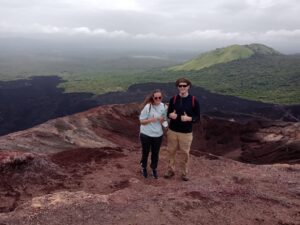
With a primary focus on pediatric and maternal infectious diseases, the UNC Program in Nicaragua has significantly contributed to the field of emerging infections, including Zika and COVID-19, and program findings have led to new understandings about childhood diarrhea, the second leading cause of child mortality worldwide.
Training at UNAN-León
Rebecca Rubinstein is a student in the UNC MD-PhD program pursuing her PhD in epidemiology, studying the bacterial and viral causes of gastroenteritis in children from UNAN-León’s microbiology laboratory. She’s also looking at how genetically determined components of breast milk impact enteric health outcomes in children.
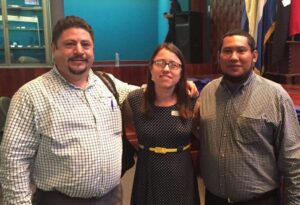
“In many low-and-middle-income countries like Nicaragua, children who get the rotavirus vaccine don’t make as many antibodies in their GI tract from the vaccine as children from higher income settings.”
Rebecca is looking at how susceptible children are to different forms of diarrhea, including viruses like the norovirus, astrovirus and rotavirus, and different bacteria such as Campylobacter.
“I’m also interested in growth trajectories for children in the first few years of life.”
Human milk oligosaccharides are compounds in breast milk and the exact distribution of them differs based on the mother’s genetics. For her dissertation, Rebecca wants to show how oligosaccharides can either increase or decrease a child’s risk of developing diarrhea, depending on the virus or the bacteria.
Rebecca’s UNAN-León mentors are Filemon Bucardo, PhD, and Samuel Vilchez, PhD, in the department of microbiology and parasitology.
Training at UNC-Chapel Hill
Soon, Rebecca will be working alongside Lester Gutierrez in the UNAN-León Lab. Lester is a PhD candidate in the recently established Biomedical Sciences PhD Program at UNAN-León established with the support of the Nicaraguan Emerging and Endemic Diseases (NEED) Training Program from the Fogarty International Center. He just returned to UNAN-León after visiting Chapel Hill to run lab assays–using technology not currently available in his home country–for his research on the parasite, Giardia lamblia.
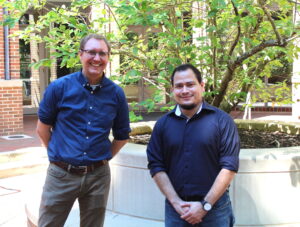
NEED leverages the longstanding, intertwined relationship between UNAN-León and UNC faculty. Since then, PhD programs in epidemiology and occupational health have been added to the program in Biomedical Sciences, to help graduates operate as independent scientists and apply for NIH grants to investigate diseases within the country.
Lester is in the first cohort pursuing his PhD in infectious diseases, learning from UNC faculty who travel to León to teach classes in person as well as teach virtually.
“Giardia is very common in my country but it is not fully understood. We know that when a child is infected, there are changes in intestinal functions that could be associated with weight loss and stunted growth. We also believe that repeated giardia infections in young children could have a significant impact on their future growth and development.”
Giardia is most common during childhood, mainly in low-and-middle income countries. Symptoms can include acute or chronic diarrhea, dehydration or abdominal pain, and the majority of infections are asymptomatic. Chronic infections, left undetected, can result in weight loss and stunted growth. Lester wants to understand the role of the innate and adaptive immune response and how it may contribute to the parasite’s health impact in children and clearance from the gut.
Reciprocal Learning Experiences
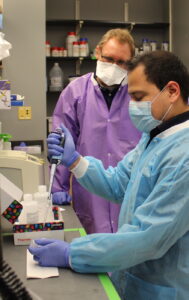
These global research exchanges are essential to the future of global health, forming student mentor bonds and introducing cultural experiences that bring life changing perspectives. Lester explains that being able to have access to UNC’s state-of-the-art laboratory infrastructure is an important aspect of his training, with UNC mentor Luther Bartelt, MD, DTM&H, associate professor in infectious diseases and microbiology and immunology, and UNAN-León mentor Samuel Vilchez, PhD, in-country director of UNC Project Nicaragua.
“Something that happens in my country is that perhaps you have a good idea to study, and you have all the samples, but you don’t have all the tools to test your ideas.”
“This program has helped me create new connections with my UNC mentor and be able to run all of the experiments I need for my dissertation project. This knowledge will be shared which can have a big impact on education, research, and clinical practice in León, showing other students that nothing is impossible. This PhD training program has opened a lot of doors for Nicaragua, and that is something very great.”
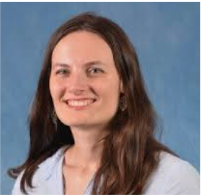
Rebecca looks forward to learning how to do the assay that will measure rotavirus vaccine response in children, learning from Lester and his colleagues, supported by her UNC and UNAN mentors.
“What I like the most about my program is honestly the opportunity to get to work with Dr. Sylvia Becker-Dreps, and do a lot of really hardcore epidemiologic methods while training in the US, but then also getting to train for a long period of time in Nicaragua, working with people like Lester as my colleague. “I feel like there aren’t a lot of graduate students who get that opportunity, to go to someone else’s country and work with their team.”
“The UNAN-León PhD program is training the next generation of scientists of really brilliant people like Lester, who are being given opportunities to reach their full potential, and that’s why these kinds of programs are so important. People like Lester are going to be the next generation of people in Nicaragua who will continue these programs.”
About IGHID & UNC Program in Project Nicaragua
Established in 2007, the Institute for Global Health & Infectious Diseases (IGHID) brings transformative solutions to the most important global health issues of our time, through research, training and service. The IGHID has saved millions of lives and shaped policy worldwide through cutting-edge research, especially in the areas of HIV, Malaria and now COVID, where UNC is the most cited university in the nation for coronavirus research. Working in over 50 countries around the globe, including Nicaragua, IGHID provides a unique pan-university framework for collaboration and facilitating global health science and practice. It is this framework that continues to catalyze a global health community committed to improving health worldwide while building the capacity of thousands of scientists and health professionals globally.
The UNC Program in Nicaragua operates through the UNAN-León Center for Infectious Disease Research (Centro de Investigación en Enfermedades Infecciosas, or CEI). CEI is located on the 40-acre UNAN-León medical campus, a 10-minute taxi ride from central León, while the University Teaching Hospital, HEODRA, is in the city center. The UNC Program in Nicaragua began as a clinical and teaching collaboration with the Universidad Nacional Autónoma de Nicaragua, León (UNAN-León) in 1999. Like UNC, UNAN-León is the oldest public university in country, founded in 1812, when Nicaragua was still under Spanish rule. UNAN-León is home to the most prestigious medical school in Nicaragua and the Hospital Escuela Oscar Danilo Rosales Argüello (HEODRA) teaching hospital. Dr. Samuel Vilchez, Professor of Microbiology at UNAN-León and adjunct associate professor in the UNC Department of Family Medicine, is the in-country director. The international director is Dr. Sylvia Becker-Dreps, IGHID member and associate professor of family medicine.
